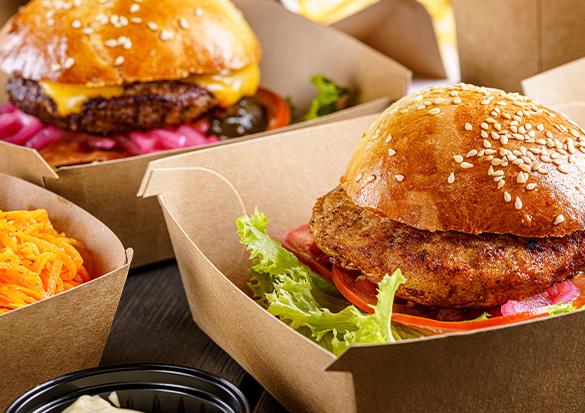The link between gut health and mood
Discover how your gut influences your mental wellbeing, and what you can do to support both.
Ever noticed that when your digestion is off, your mood dips too? Maybe you’ve felt irritable, foggy, or low after a weekend of takeaways and little sleep. You’re not imagining it, there’s a powerful link between gut health and mood, and science is beginning to catch up with what many of us have long suspected.
Your gut and brain are constantly communicating. This connection, called the gut-brain axis, helps regulate your immune system, hormone production, and emotional responses. And it all starts with your gut microbiota, the trillions of microbes living in your digestive tract.
In this article, we explore:
- How your gut and brain communicate
- How your gut microbiota affects mood and mental health
- The link between gut issues and neurodivergent conditions like ADHD and autism
- Whether a poor diet can mimic or worsen mental illness
- Practical ways to support both your gut and your mood
What is the gut-brain axis?
The gut-brain axis is a two-way communication system linking your central nervous system (brain and spinal cord) with your enteric nervous system (the second brain in your gut). They talk via hormones, immune messengers, and neurotransmitters like serotonin, around 90% of which is made in the gut [1].
Your gut microbiota plays a key role in this communication. A healthy gut helps regulate inflammation, support your immune response, and produce mood-influencing chemicals such as serotonin, dopamine, and amino acid derivatives that affect how you feel.
The vagus nerve, one of the longest nerves in your body, is a major part of this system. It acts like a phone line between your gut and brain, transmitting chemical and emotional signals in both directions.
Can gut health affect your mood?
Yes, and not just in theory. Clinical trials have found that people with depression and anxiety often show signs of dysbiosis - an imbalance in the gut microbiota. Lower levels of beneficial bacteria like Lactobacillus and Bifidobacteria have been linked to mood disorders [2].
When your gut is inflamed or out of balance, it can send stress signals to your brain via the vagus nerve, triggering low mood, anxiety, or even brain fog.
Researchers suggest that improving gut health could reduce the severity or frequency of mood symptoms, particularly in people experiencing mild to moderate depression or anxiety.
What is dysbiosis?
Dysbiosis occurs when the balance of good and bad microbes in your gut is disrupted. It may increase gut permeability (also called "leaky gut") and promote low-grade inflammation, a possible contributor to mental health conditions.
Common causes of dysbiosis include:
- Diets high in ultra-processed foods
- Long-term stress
- Poor sleep
- Antibiotic use
- Gastrointestinal infections
Gut health, neurodivergence, and mental wellbeing
People with neurodivergent conditions like ADHD or autism often experience digestive issues such as irritable bowel syndrome (IBS), bloating, or constipation.
Studies show that individuals with autism may have different gut microbiota compared to neurotypical people [3]. And while diet doesn’t cause neurodivergence (it's mostly a genetic), sensitivities to blood sugar fluctuations or nutrient deficiencies may worsen symptoms like focus issues or emotional regulation in people with ADHD [4].
Supporting gut health may help ease the side effects or challenges associated with neurodivergent conditions, though more research is still needed.
Can a poor diet mimic or worsen mental illness?
Absolutely. A diet low in essential nutrients or high in processed food can mimic or amplify symptoms like low mood, anxiety, fatigue, or restlessness.
For example, deficiencies in magnesium, B vitamins, iron, or omega-3 fatty acids have been linked to mood changes [5]. Unstable blood sugar can also lead to irritability or brain fog, symptoms easily confused with mental health conditions. You can read more about how your biomarkers affect your mental health in our blog.
While diet isn’t the sole cause of mental illness, it may be a missing piece of the puzzle. Supporting your gut and brain with nourishing foods could make a bigger difference than you think.

How to support gut health and mood
Making small changes to your diet and lifestyle can improve both your gut and your emotional wellbeing.
Try these seven evidence-backed steps:
- Eat more fibre – Fibre feeds beneficial bacteria. Aim for a variety of vegetables, whole grains, lentils, and nuts.
- Include fermented foods – Natural sources of live bacteria, like yoghurt, kefir, kimchi, sauerkraut, miso, and kombucha, support a balanced gut microbiota.
- Cut back on processed foods – Ultra-processed food can harm gut health and destabilise blood sugar.
- Get enough sleep – Lack of sleep affects your gut bacteria and can heighten stress and mood swings.
- Stay active – Exercise supports digestion, reduces inflammation, and boosts feel-good hormones.
- Manage stress – Stress disrupts the gut-brain axis. Try yoga, mindfulness, deep breathing, or spending time in nature.
- Consider the Mediterranean diet – Rich in fibre, healthy fats, and polyphenols, this anti-inflammatory diet is associated with lower rates of depression [6].
Can probiotics help?
Some probiotic strains — particularly Lactobacillus and Bifidobacterium — show promise in reducing symptoms of anxiety and depression, especially when paired with a healthy diet and lifestyle [7].
These strains may support the gut-brain connection, but they’re not a quick fix. Results can vary, and more trials are needed to confirm their long-term effects.
Can you test your gut health?
While there’s no one-size-fits-all test for dysbiosis, blood tests can help uncover signs that your gut or diet may be affecting your mental wellbeing.
You can check for:
- Vitamin and mineral deficiencies
- Inflammation markers
- Blood sugar and cholesterol levels
- Liver and thyroid function
An Optimal Health Blood Test or a more specific test from our nutrition test range is a good place to start, especially if you’re making changes to your diet or struggling with symptoms linked to gut health and mood.
Finally, trust your gut
Your gut does much more than digest food. It helps produce key brain chemicals, manage inflammation, and keep your immune system in check — all of which affect your mental wellbeing.
Improving gut health and mood doesn’t have to mean overhauling your life. Small, sustainable changes to what you eat, how you sleep, and how you manage stress can have a powerful impact.
If you’re struggling with low mood, fatigue, or digestive issues, start by checking in with your health from the inside out. Explore our range of nutrition blood tests to get personalised insights into your nutrient levels and health markers.
And if you’re finding it hard to cope, don’t go it alone — speak to your GP or visit Hub of Hope to find support near you.
FAQs
1. Can poor gut health cause mental health issues?
Research suggests that gut microbiota imbalances can influence conditions like depression and anxiety by affecting inflammation, neurotransmitter production, and communication along the gut-brain axis.
2. How can I improve my gut health to support my mood?
Eat more fibre and fermented foods, reduce processed foods, manage stress, prioritise sleep, and move your body regularly.
3. Are probiotics good for mental health?
Some probiotic strains may help reduce anxiety and depression when taken consistently and paired with a healthy lifestyle.
4. What is the gut-brain axis?
It’s the communication system between your gut and brain, involving the vagus nerve, hormones, immune signals, and the gut microbiota.
5. Can I test my gut health?
There’s no single test for dysbiosis, but blood tests can identify inflammation, nutrient gaps, and other health markers that impact both gut health and mental health.
References
- Martin, C. R., Osadchiy, V., Kalani, A., & Mayer, E. A. (2018). The brain-gut-microbiome axis. Cellular and Molecular Gastroenterology and Hepatology, 6(2), 133–148. https://doi.org/10.1016/j.jcmgh.2018.04.003
- Foster, J. A., & McVey Neufeld, K. A. (2013). Gut–brain axis: how the microbiome influences anxiety and depression. Trends in Neurosciences, 36(5), 305–312. https://doi.org/10.1016/j.tins.2013.01.005
- Kanchanatawan, B., Sirivichayakul, S., & Maes, M. (2023). Role of gut microbiota in depression: A systematic review. Frontiers in Psychiatry, 14, 1031561. https://doi.org/10.3389/fpsyt.2023.1031561
- Valles-Colomer, M., Falony, G., Darzi, Y., Tigchelaar, E. F., Wang, J., Tito, R. Y., ... & Raes, J. (2019). The neuroactive potential of the human gut microbiota in quality of life and depression. Nature Microbiology, 4(4), 623–632. https://doi.org/10.1038/s41564-019-0441-1
- Chang, J. P. C., Lin, C. Y., Lane, H. Y., & Tsai, G. E. (2021). Adjunctive probiotics for depression: A meta-analysis of randomized controlled trials. Nutrients, 13(6), 1957. https://doi.org/10.3390/nu13061957
- Lassale, C., Batty, G. D., Baghdadli, A., Jacka, F., Sánchez-Villegas, A., Kivimäki, M., & Akbaraly, T. (2019). Healthy dietary indices and risk of depressive outcomes: a systematic review and meta-analysis of observational studies. Molecular Psychiatry, 24(7), 965–986. https://doi.org/10.1038/s41380-018-0237-8
- Wallace, C. J. K., & Milev, R. (2017). The effects of probiotics on depressive symptoms in humans: a systematic review. Annals of General Psychiatry, 16, 14. https://doi.org/10.1186/s12991-017-0138-2
- Rytter, M. J. H., Andersen, L. B. B., Houmann, T., Bilenberg, N., Hvolby, A., & Schmidt, R. (2015). Gastrointestinal symptoms in children with autism spectrum disorder: a systematic review. BMJ Open, 5(6), e007144. https://doi.org/10.1136/bmjopen-2014-00714
Related tests
Unlock a deeper understanding of your health with our most comprehensive panel covering 59 biomarkers
- Results estimated in 4 working days
- 59 biomarkers
Venous collection
Select testDiscover if your diet is truly supporting your health with a comprehensive look at essential vitamins and minerals
- Results estimated in 2 working days
- 11 biomarkers
Finger-prick or Venous collection
Select testStay on top of your game with our advanced blood test for men
- Results estimated in 3 working days
- 44 biomarkers
Venous collection
Select testTake control of your health with our best-selling female health check
- Results estimated in 3 working days
- 47 biomarkers
Venous collection
Select test





